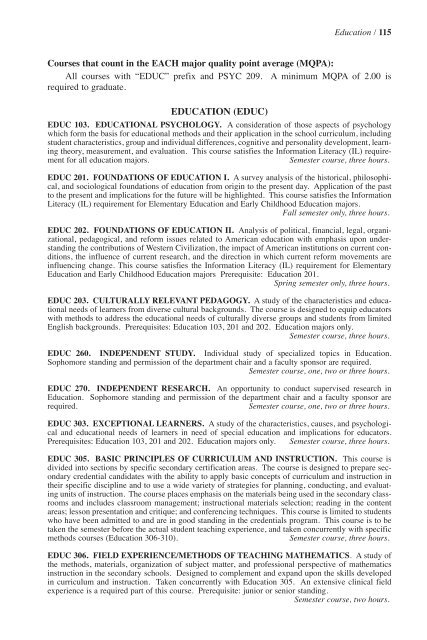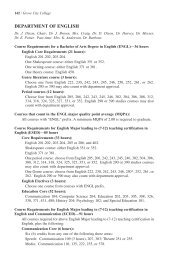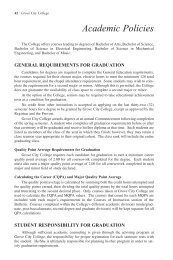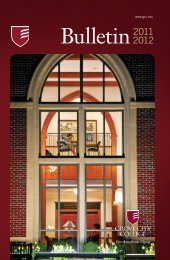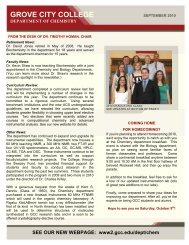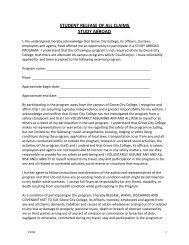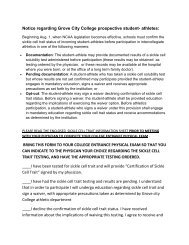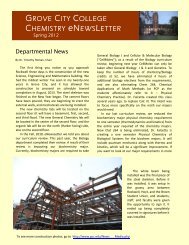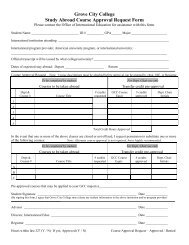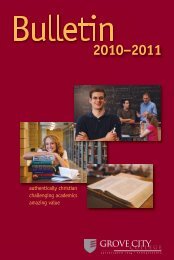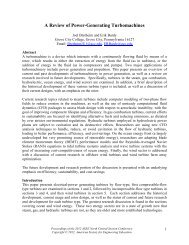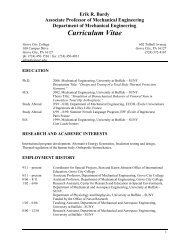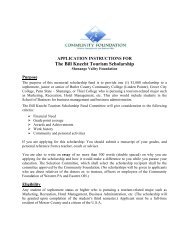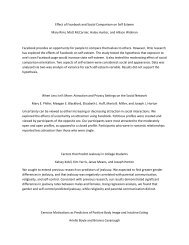2009–2010 - Grove City College
2009–2010 - Grove City College
2009–2010 - Grove City College
Create successful ePaper yourself
Turn your PDF publications into a flip-book with our unique Google optimized e-Paper software.
Education / 115<br />
Courses that count in the EACH major quality point average (MQPA):<br />
All courses with “EDUC” prefix and PSYC 209. A minimum MQPA of 2.00 is<br />
required to graduate.<br />
EDUCATION (EDUC)<br />
EDUC 103. EDUCATIONAL PSYCHOLOGY. A consideration of those aspects of psychology<br />
which form the basis for educational methods and their application in the school curriculum, including<br />
student characteristics, group and individual differences, cognitive and personality development, learning<br />
theory, measurement, and evaluation. This course satisfies the Information Literacy (IL) requirement<br />
for all education majors. Semester course, three hours.<br />
EDUC 201. FOUNDATIONS OF EDUCATION I. A survey analysis of the historical, philosophical,<br />
and sociological foundations of education from origin to the present day. Application of the past<br />
to the present and implications for the future will be highlighted. This course satisfies the Information<br />
Literacy (IL) requirement for Elementary Education and Early Childhood Education majors.<br />
Fall semester only, three hours.<br />
EDUC 202. FOUNDATIONS OF EDUCATION II. Analysis of political, financial, legal, organizational,<br />
pedagogical, and reform issues related to American education with emphasis upon understanding<br />
the contributions of Western Civilization, the impact of American institutions on current conditions,<br />
the influence of current research, and the direction in which current reform movements are<br />
influencing change. This course satisfies the Information Literacy (IL) requirement for Elementary<br />
Education and Early Childhood Education majors Prerequisite: Education 201.<br />
Spring semester only, three hours.<br />
EDUC 203. CULTURALLY RELEVANT PEDAGOGY. A study of the characteristics and educational<br />
needs of learners from diverse cultural backgrounds. The course is designed to equip educators<br />
with methods to address the educational needs of culturally diverse groups and students from limited<br />
English backgrounds. Prerequisites: Education 103, 201 and 202. Education majors only.<br />
Semester course, three hours.<br />
EDUC 260. INDEPENDENT STUDY. Individual study of specialized topics in Education.<br />
Sophomore standing and permission of the department chair and a faculty sponsor are required.<br />
Semester course, one, two or three hours.<br />
EDUC 270. INDEPENDENT RESEARCH. An opportunity to conduct supervised research in<br />
Education. Sophomore standing and permission of the department chair and a faculty sponsor are<br />
required. Semester course, one, two or three hours.<br />
EDUC 303. EXCEPTIONAL LEARNERS. A study of the characteristics, causes, and psychological<br />
and educational needs of learners in need of special education and implications for educators.<br />
Prerequisites: Education 103, 201 and 202. Education majors only. Semester course, three hours.<br />
EDUC 305. BASIC PRINCIPLES OF CURRICULUM AND INSTRUCTION. This course is<br />
divided into sections by specific secondary certification areas. The course is designed to prepare secondary<br />
credential candidates with the ability to apply basic concepts of curriculum and instruction in<br />
their specific discipline and to use a wide variety of strategies for planning, conducting, and evaluating<br />
units of instruction. The course places emphasis on the materials being used in the secondary classrooms<br />
and includes classroom management; instructional materials selection; reading in the content<br />
areas; lesson presentation and critique; and conferencing techniques. This course is limited to students<br />
who have been admitted to and are in good standing in the credentials program. This course is to be<br />
taken the semester before the actual student teaching experience, and taken concurrently with specific<br />
methods courses (Education 306-310). Semester course, three hours.<br />
EDUC 306. FIELD EXPERIENCE/METHODS OF TEACHING MATHEMATICS. A study of<br />
the methods, materials, organization of subject matter, and professional perspective of mathematics<br />
instruction in the secondary schools. Designed to complement and expand upon the skills developed<br />
in curriculum and instruction. Taken concurrently with Education 305. An extensive clinical field<br />
experience is a required part of this course. Prerequisite: junior or senior standing.<br />
Semester course, two hours.


